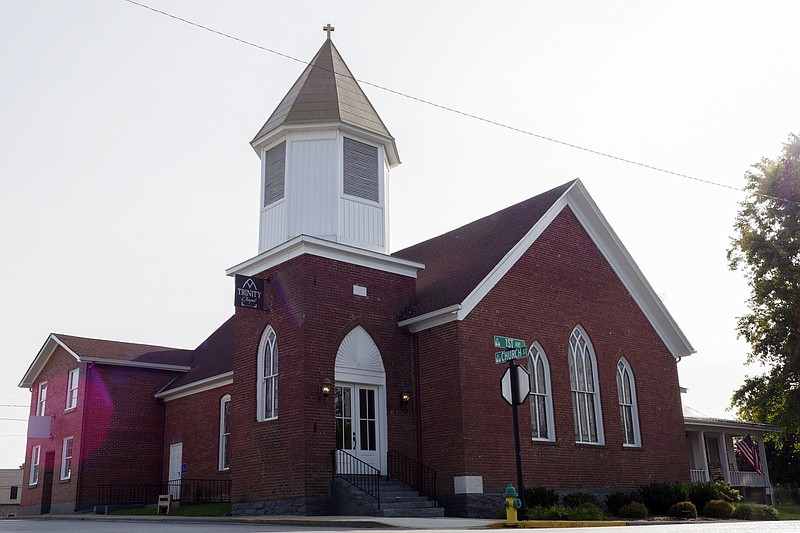The circa-1887 First Avenue Methodist Episcopal Church in downtown Dayton, Tennessee, now called Trinity Chapel, has been nominated for a designation on the National Register of Historic Places, according to the Tennessee State Review Board.
The church at the corner of First Avenue and Church Street dates back to 1887, just 10 years after Reconstruction ended, and it features handmade bricks, an octagonal tower and arched stained-glass windows in a building constructed in the Gothic Revival style.
Its cornerstone reads, "First Avenue M.E. Church 1887."
John and Lindsey Bamber bought the church in July 2017 from the Holston Conference of the United Methodist Church. The church had sat empty for about seven years, Lindsey Bamber said last week following the nomination announcement.
"By the year 2000 it had begun to fall into ruin," Bamber said. "From the stained glass windows, to the working bell from 1889, we've brought this gem back to her former glory."
The Bambers had a lot of work to do to get the 133-year-old building ready to become a commercial operation.
Bamber said a vintage lectern, four original pews and restored window frames where needed "have proven to be wonderful additions for the decor of a variety of events."
Bamber said that while the church is up for nomination to the register, the parsonage next door isn't included but is an integral part of the event venue and has also been restored for use as a rental space or used during events.
Bamber also helped with the nomination, she said.
TENNESSEE NOMINEES FOR 2020
Millennium Manor – Blount CountyFirst Avenue Methodist Episcopal Church (Trinity Chapel) – Rhea CountyKingsport Hosiery Mill – Sullivan CountyJohnson City Postal Savings Bank and Post Office – Washington CountyMount Olive Cemetery – Montgomery CountyHughes House – Wayne CountySource: Tennessee Historical Commission
"We started the process at least a year and a half ago just trying to make a way to keep it protected and recognized for its historical significance," Bamber said.
(READ MORE: Chattanooga site added to National Register of Historic Places)
An expert in historic preservation wrote the nomination document and said the new owners have revived the historic chapel.
"Trinity is a great church representing a rural Gothic Revival style of architecture, which is much simplified in that type of architecture, and it has all the history related to the Scopes trial in Dayton and the Methodist church," said Melissa Mortimer, historic preservation planner with the nonprofit Southeast Tennessee Development District. "The Bambers have done a great job in restoring the chapel and giving it a new life."
There are more steps en route to the National Register, Mortimer said.
"The state review board in Nashville will approve or deny nomination or make comments on the nomination, and then it is sent to the National Park Service Keeper of the National Register of Historic Places," Mortimer said.
The park service then can approve or deny the nomination, sometimes recommending changes for another nomination effort, she said.
"The chapel not only stands as the oldest church in Rhea County but is the only church that still represents the Gothic Revival style from its original construction without major alterations," the nomination states.
Mortimer said the church's place in history is remarkable.
In 1884, the issue of slavery resulted in the split of the Methodist church. It was during this time that the Methodist Episcopal Church South seceded from the Methodist Episcopal Church, according to nomination documents. The Southern Church conducted its activities in the southern states, while the Methodist Episcopal Church operated in the northern states.
From the beginning of the Methodist Episcopal in America, the question of slavery took center stage at both the annual and general conference, documents state.
First Avenue Methodist Episcopal Church was organized when the Methodist Church in Rhea County divided over the slavery issue in 1844, and First Avenue Church was associated with the Northern Methodist Branch, headquartered in Philadelphia, Pennsylvania, according to documents. The current church property was originally purchased May 17, 1886, and the church was built the next year.
The nomination document contains information written by Pauline Wilkey Greer and later collected for the nomination by Rhea County Historian Patricia Guffey. One note from Greer relates to the church's 100th anniversary and opening of the cornerstone in May 1987.
Inside the cornerstone were notes on the church's earliest days; the First Sunday School was held at 9:30 in November 1887 with 86 present; at the end of the quarter, average attendance was 172, average enrollment 119; a list of members on Oct. 21, 1887, included Mr. and Mrs. W. Thomas, F.A. and Tennie Fisher, W.A. Faust, J.W. Truex, W.J. Eakins, James Ward, Mr. and Mrs. W.A. Elder, though the rest are not legible, according to Greer's notes provided by Bamber.
In cold weather, the church furnace's heat register was where everyone stood and sometimes the shoe leather could be smelled burning, according to Greer's notes.
The church's history also has links to the famed Scopes Trial, the legendary legal contest in 1925 between William Jennings Bryan and Clarence Darrow over evolution being taught in local schools, according to the nomination.
(READ MORE: Statue for lawyer in famous Dayton, Tenn. Scopes Trial unveiled)
A point of related historical interest occurred during the Scopes Trial when the church's pastor, the Rev. Howard G. Byrd, who believed in evolution, invited a Unitarian preacher, Charles Potter, to speak on evolution, a move that generated a heated backlash for Byrd.
"This infuriated his congregation, and they threatened mutiny," notes from Guffey's collected accounts from Greer state. "So Byrd announced that he had quit."
Guffey notes the little church's place in Rhea County lore in her missive, "Pieces from the Past," written in November 2017 as the Bambers took on the renovation.
"This church is involved with so much history of Rhea County," she wrote. "It is wonderful to see that Lindsey and John are preserving the history involved with this building, and that they are interested in the restoration process. We can see that it is necessary to study the past in order to live in the present and be part of the future.
Mortimer said more will be known about the church's trek to the National Register later this month.
The State Review Board meets Sept. 16 to discuss the six sites nominated in Tennessee this year.
Contact Ben Benton at bbenton@timesfreepress.com or 423-757-6569. Follow him on Twitter @BenBenton or at www.facebook.com/benbenton1.

